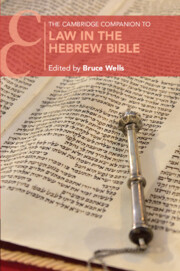2 results
3 - The Nature of the Collections
- from Part II - The Biblical Legal Collections
-
-
- Book:
- The Cambridge Companion to Law in the Hebrew Bible
- Published online:
- 11 April 2024
- Print publication:
- 18 April 2024, pp 55-75
-
- Chapter
- Export citation

The Cambridge Companion to Law in the Hebrew Bible
-
- Published online:
- 11 April 2024
- Print publication:
- 18 April 2024

